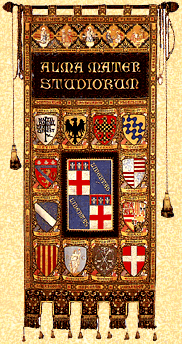
|
Dictum before chapter 1, Distinctio 1:
The Human Race is ruled by two things: namely, natural law and usages (mos).
Natural law is what is contained in the law and the Gospel. By it, each person is
commanded to do to others what he wants done to himself and is prohibited from inflicting
on others what he does not want done to himself. |
| D.1 c.5: Custom (Consuetudo)
is a sort of law established by usages and recognized as ordinance when ordinance is
lacking (gloss to "is lacking") |
| D.12 c.6: Long standing
usages aprroved by the consent of those following them are like ordinances. |
| D.1 c.6: Law is either
natural, civil, or that of nations. |
| D.1 c.7: Natural law is
common to all nations because it exists everywhere through natural instinct not because of
any enactment. |
| D.1 c.8: Civil law is what
each people and each commonwealth establishes as its own law, for divine or human reasons. |
| D.1 c.9: The law of nations
deals with the occupation of habitations, with building, fortification, war, captivity,
servitude . . . |
| D.2: Definitions of Roman
legislation |
| D.3: Definitions of canon law |
| D.4 dictum after c.3:
Ordinances are instituted when they are promulgated; they are confirmed when
they have been approved by the usage of those who observe them. |

|
D.5 dictum before c.1: Now,
let us return to the difference between natural law and other laws. Natural law
receives first place among all others because of it s age and dignity. For it began
with the appearance of rational creatures and does not change over time, but remains
immutable. |
| D.6 dictum after c.3 (p.22):
Customary law began after natural law when people began to gather as one and live
together. |
| D.8 dictum before c.1:
Natural law differs from custom and enactment. By natural law all things are
common to all people . . . So Plato lays out the order for a very just
commonwealth where no one considers anything his own. |
| D.8 dictum after c.1: Now
natural law similarly prevails by dignity over custom and enactments. |
| Gloss to D.1 c.1: "is
moral": that is, it is equitable when there is a reason and the passing through
does not disturb another . . . Again, by divine law it is permissible to eat
grapes in another's field but not to take them away. (p.4) |
| D.9 dictum after c.11: Since
therefore nothing is ordered by natural law unless God wishes it, and nothing is forbidden
unless God forbids it, and since everything in the canonical scriptures is divine
ordinance, divine ordinance is indeed consonant with nature. |
| D10: Ecclesiastical law is
superior to secular law |
| D.11-D.12: Ordinances
abrogate or derogate custom |
| |
| |
